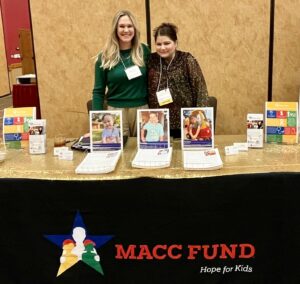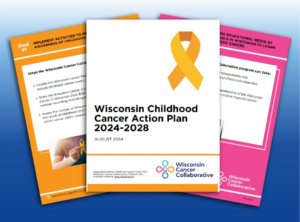CAC2 Member Blog–Wisconsin Pediatric Cancer Action Plan Published!
By CAC2 Member Autumn Gentry, MACC Fund
This collaborative state advocacy effort was due to the dedicated work of a pair of CAC2 members in Wisconsin building on the work that came together from other CAC2 members’ efforts. We love to celebrate when our members work together!
I have been developing an advocacy arm for the MACC Fund with no formal experience or training, relying only on my personal connection to childhood cancer. I’ve noticed a pattern in getting things done:
- Start with an informed idea.
- Take a step forward.
- Listen for feedback.
- Connect with the right people.
- Repeat, one small step at a time.
I don’t always know what I’m doing or fully understand the systems I’m navigating, but there’s a certain magic in taking risks, stepping into the unknown, and making it work wherever you land.
One of my initial goals was securing pediatric cancer recognition in the Wisconsin Cancer Plan. To pursue this, I joined the Wisconsin Cancer Collaborative (WCC) in the spring of 2023 and attended a regional meeting in March with no plan other than to make one meaningful connection. During breakfast, I shared my personal connection to childhood cancer at my table, which sparked interest among attendees unfamiliar with the disease. When the director asked for insights, a woman who had heard my story stood up and encouraged me to share it with the entire room. Stunned, I slowly stood, gave a brief overview of the challenges in pediatric cancer, and expressed my hope that the collaborative would address these concerns.
After the meeting, a WCC staff member approached me to discuss my goals. While our conversation was constructive, I learned about the collaborative’s limitations, especially its CDC funding constraints, which focus on cancers that can be screened for. I left the meeting discouraged and unsure of my next steps. Nevertheless, I sent a thank-you email to maintain a positive connection. To my surprise, the staff member responded with follow-up questions, opening a small but crucial window of opportunity.
I began sending her relevant information about pediatric cancer, and as her responses were positive, I started organizing my efforts more systematically. I sought advice from Ann Ramer and Vickie Buenger from CAC2, who provided valuable resources, including the Kiers’ Kidz Report, which compiles pediatric cancer topics and language from state cancer plans nationwide. After thoroughly reviewing this report, I formulated my suggestions for the Wisconsin Cancer Plan. After submitting them, there was radio silence. I became discouraged yet again.
Last September, I met Mariah Forster Olson at CureFest. Mariah is a neuroblastoma survivor, CAC2 member, advocate, and a fellow Wisconsinite. We instantly connected over our passion for expanding advocacy efforts in Wisconsin. After our initial meeting, I invited Mariah to join the Wisconsin Cancer Collaborative to bring the vital perspective of a survivor into the conversation.
 When Mariah joined the collaborative, I invited her to accompany me to the Wisconsin Cancer Summit in November. At the summit, Mariah and I hosted a MACC Fund table among the exhibitors, hoping to raise awareness of pediatric cancer needs. While we were at our table, the director of the collaborative stopped by to share some exciting news. The steering committee reviewed the documents I submitted over the summer and discussed my proposal. She was thrilled to announce that they would be adding pediatric cancer to the current cancer plan through several amendments. Additionally, she asked if we would like to collaborate to create a state action plan specifically for pediatric cancer.
When Mariah joined the collaborative, I invited her to accompany me to the Wisconsin Cancer Summit in November. At the summit, Mariah and I hosted a MACC Fund table among the exhibitors, hoping to raise awareness of pediatric cancer needs. While we were at our table, the director of the collaborative stopped by to share some exciting news. The steering committee reviewed the documents I submitted over the summer and discussed my proposal. She was thrilled to announce that they would be adding pediatric cancer to the current cancer plan through several amendments. Additionally, she asked if we would like to collaborate to create a state action plan specifically for pediatric cancer.
Following this unexpected shift, Mariah and I regularly met via Zoom with the director and another WCC staff member to develop the cancer plan amendments and the pediatric cancer action plan. After Mariah and I submitted a list of our top priorities, we were surprised to find that they accepted nearly all our suggestions. Ultimately, some were incorporated into the 10-year Wisconsin Cancer Plan and the rest into the 5-year Childhood Cancer Action Plan. Together, we outlined actions that individuals, organizations, and institutions could take to support these goals.
Over several months, we refined our draft, which was then submitted to the steering committee for approval. Once approved, we circulated the action plan to national organizations and hospital systems for feedback and endorsement. By March 2024, children were included in the 2020-2030 Wisconsin Cancer Plan. As of August 8, 2024, we have the first-ever Wisconsin Childhood Cancer Action Plan.
Advocacy work can be thankless and discouraging and lead to a defensive “us against them” mentality. However, my experience showed me that those working in cancer control and public health are on our team. In my case, persistence and partnership made all the difference. The initial “Nope, can’t do” seems to have stemmed from a lack of awareness, not indifference. Our responsibility as advocates is to educate others and to seize opportunities. People do care.
Mariah and I remain deeply grateful for the open-minded approach of the Wisconsin Cancer Collaborative. We believe this is a significant step forward for our state and are deeply moved by the hope it will bring families when people, institutions, and organizations across Wisconsin take ownership of their role in the fight against childhood cancer. Taking one small step at a time, partnering with the right people, and trusting our instincts has brought us here. But we still need to push Wisconsin to do better and do more. This is just the beginning!
 The Wisconsin Childhood Cancer Action Plan 2024-2028 addresses:
The Wisconsin Childhood Cancer Action Plan 2024-2028 addresses:
- Awareness
- Data Collection
- Education of Medical Professionals
- Development of Palliative and Hospice Care
- Accessibility of Quality Care
Find the plan here:
https://wicancer.org/resource/childhood-cancer-action-plan-2024-2028/
Categories
- Blog Posts (117)
- Explainer Post (12)
- Guest Blogs (30)
- Member Blogs (42)
- Survivorship Matters Blog (9)
- CAC2 News (23)
- Collaborative Achievements (15)
- Community News (274)
- In Memoriam (2)
- News Digest (223)
- Webinars (64)